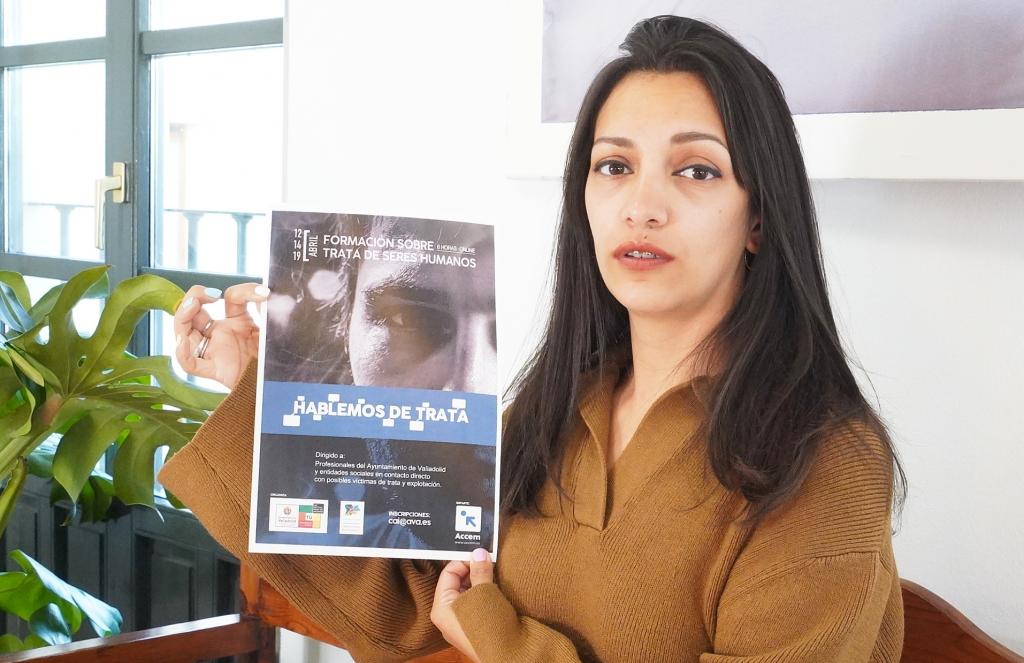Thessaloniki gets ready for its metro launch in November
The underground rapid transit lines have been under construction for almost two decades due to various project delays
 TheMayor.EU logo
TheMayor.EU logo 
Carmen Jiménez, Valladolid Councilor for Coexistence, presents the training , Source: Ayuntamiento de Valladolid
This is part of a broader Intercultural Citizen Coexistence Plan
Today, 12 April, a 3-part online course will begin in Valladolid, which will have the purpose of boosting local social workers’ skills in terms of identifying and reporting crimes related to human trafficking. The local authorities consider it unacceptable that in the 21st century such practices still exist, and even thrive, so this is a necessary action to take into recognizing and preventing it.
The whole course is planned to take 6 hours in total, divided into 3 sessions (on 12, 14 and 19 April), which are reportedly part of a broader training programme called ‘Let’s talk about trafficking’, organized by the local Department of Social Services. The programme itself will conclude with a cycle of three conferences in the month of May – and these will present different perspectives of the issues, such as police, judicial and labour aspects combined with international practices.
Naturally, such a complex problem has a multitude of dimensions and it is necessary for people working in that field to be well-aware of all of them. Reportedly, in Spain, 1561 trafficking victims were released in 2019. Of these, 71% were women and girls, which demonstrates that this social ill can affect all genders and ages.
There are also numerous reasons why people get trafficked. This happens not only transnationally but also within a country’s borders. Sexual exploitation is expectedly one of the major reasons, and when it comes to that women do represent the astounding majority of victims (96%).
However, there are other reasons, too, such as labour exploitation, begging, forced marriages and even the forced commitment of crimes. As such, there is a variety of psychological, social and economic deficiencies and incentives that contribute to the problem. The Valladolid Department of Social Services will pay special attention to the guidelines for detection, intervention and support for the victims during the training, as these are the three pillars of social work.

The underground rapid transit lines have been under construction for almost two decades due to various project delays

Now you can get your wine in Talence by paying directly in Bitcoin

That’s because the state has to spend money on updating the railway infrastructure rather than subsidizing the cost of the popular pass

Rethinking renewable energy sources for the urban landscape

The examples, compiled by Beyond Fossil Fuels, can inform and inspire communities and entrepreneurs that still feel trepidation at the prospect of energy transition

Now you can get your wine in Talence by paying directly in Bitcoin

The 10th European Conference on Sustainable Cities and Towns (ESCT) sets the stage for stronger cooperation between the EU, national and local level to fast track Europe's transition to climate neutrality.

At least, that’s the promise made by the mayor of Paris, Anne Hidalgo

The underground rapid transit lines have been under construction for almost two decades due to various project delays

At least, that’s the promise made by the mayor of Paris, Anne Hidalgo

Hostal de Pinós is located in the geographical centre of the autonomous region

Despite its church-y name, the district has long been known as the hangout spot for the artsy crowds

Urban dwellers across the EU are having a say in making their surroundings friendlier to people and the environment.

Forests in the EU can help green the European construction industry and bolster a continent-wide push for architectural improvements.

Apply by 10 November and do your part for the transformation of European public spaces

An interview with the Mayor of a Polish city that seeks to reinvent itself

An interview with the newly elected ICLEI President and Mayor of Malmö

A conversation with the Mayor of Lisbon about the spirit and dimensions of innovation present in the Portuguese capital














